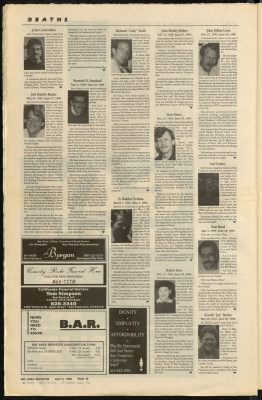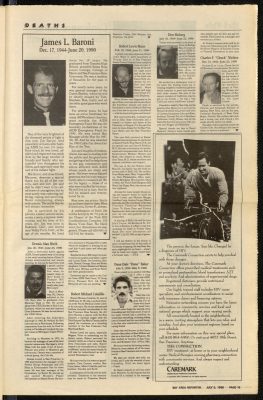One of the very few times the bi presence at Prides in London got mentioned was in an article by Charlotte Raven in the Observer's 'Observer Life' magazine in October 1995.
Around this point in time, Raven had an affair with the "outrageously outspoken" and "usually offensive" writer Julie Burchill. Both also had long relationships with men, but as we'll see, neither liked the term 'bisexual' to describe their attraction to more than one gender.
Raven had a regular column in the Guardian, but this was as part of the 'FutureSex' features in the Sunday paper's magazine that week:
Bisexuality has been touted as the 1990s equivalent of Free Love. But is gender-surfing the way ahead if you fancy Kate Moss and Liam Gallagher, or just a greedy distraction from genuine commitment?
swap shop
By Charlotte Raven
Photo by Tim O'Sullivan
AT THE GAY PRIDE festival I pre-emptively attended[1]She'd had a long history of relationships with men before the one with Burchill. several years ago I was greatly upset by two things. First, there was the problem of the large number of people who, for aesthetic or other reasons, had seen fit to poke things through parts of their anatomy. According to my companion on the day, the practice of personal mutilation (body decoration if you wish) has got something to do with empowerment – a word which used to invoke politics and now covers tree hugging, high-interest savings accounts and, yes, describes that sense of self-worth you must feel sticking cold metal into unsullied flesh. Some taboos, it must be said, exist for a very good reason.
The second thing which struck me was the bisexual stall. Staffed by a wistful but nonetheless cheery selection of the self-identified Undecided, the purpose of the exercise seemed to be to increase visibility, that oddly unchallenged goal of all 1990s sexual sub-genres, while trying to sell bisexuality as an exciting and viable lifestyle option. Towards the latter end they were peddling propaganda which hopefully suggested that riding the sexual metronome would give you 'Twice the Fun!'.
It's that exclamation mark, recalling the self-conscious attempts at chattiness you get in a parish newsletter, which made me think bisexuality, for them, might not be quite such a laugh as they claimed. No one who is really having fun would ever need to emphasise it thus. (Have you ever been to a party, advertised as a PARTY!, which was actually any good?) And that phrase – 'Twice the Fun!' – it sounds like one of those restaurants which, in allowing you to Eat All You Can!, appeals to your basest gluttony and denies discrimination any role.
Bisexuality does sound a lot like libidinal greed. And the bisexuals, that band of insatiable sexual gourmands, sound just like the sort to insist that you serve their main courses and puddings at once. Unfortunately, throughout the inauspicious history of this indiscriminate finger buffet, its adherents have done little to challenge this view.
The writer Hanif Kureishi once described the delights of his own teenage gender-hopping by suggesting that the potential of a party was greatly improved if you realised that, theoretically at least, you could go home with anyone. Which doesn't necessarily imply that they all would – in fact, quite the converse – assuming that most of them won't, the bisexual will nonetheless have maximised the chances of one of them snagging themselves in the net. So what appears to be greed is actually desperation or, from another angle, the pragmatic good sense to write rejection into your accounting.
Bisexuality, like body piercing, can sometimes look like self-loathing posing as front. You will only feel the benefits of doubling your constituency if you weren't going to get any votes from the first. And bisexuals, like body-mutalees, have suffered, in the past, from social stigmatisation, political marginalisation and the terrible burden of seeming to have brought it all on themselves. Straights didn't like them because they could have been gay. Gays didn't like them because they should not have been straight.
As Amelia, a lesbian friend of mine, once put it: 'What kind of fool wants to crawl once they've learned how to walk?' Gay identity, as outing shows, will always demand a commitment. The fact that, as a bisexual, you could crawl off into the sunset with some bozo from the opposite camp was never going to help to make you a hit with the girls. In some sense, Amelia was right. There is a kind of affectlessness in failing to come down on either side. It is no accident that the characters in Bret Easton Ellis novels are as lazily bisexual as they are emotionally torpid. Gender-surfing is, for them, an expression of a sexual
The bisexual stall was staffed by a wistful but nonetheless cheery selection of the self-identified Undecided, trying to sell bisexuality as an exciting and viable lifestyle option
distraction which prevents them from committing to either. And introduced in Ellis is the idea of bisexuality as the very last word in your fin-de-siècle debauchwear. Because ever since those mi-siècle decadents swung every
which way in 1930s Berlin, bisexuality has signified depravity more often than self-doubt or indecision.
In the video for Madonna's Justify My Love we have a whole cast of limp and long-limbed Dorian Gray types who are draped across beds, chaise longues, Madonna and each other. We are voyeurs at an 'orgy' which could have been a bus queue for all you can tell from the expressions on anyone's face. The whole frigid episode concludes with this didactic peroration: 'Poor is the man whose pleasures depend on permission from another.' Or, as she has more lately put it: 'Express yourself. Don't repress yourself.' Which is quite like 'Let Your Hair Down!' as an exhortation in an advert for a Labour Party dance, but not a bit like 'Screw The Arse Off Every Human Specimen You See'. In Ms Ciccone's oeuvre, bisexuality represents libidinal self-expression to a heterosexual audience. We are not really encouraged to try it at home – but it's great for reminding all you uptight little straight girls that you really should give blow-jobs without waiting to be asked.
So even when bisexuality starts making its claims as the hottest sex-kick on the block, there's the same lurking naffness which would stop you from climbing on board. Partly, I think, it's the word itself. Mostly it's the sexuality
bit. This is a word which has always, to me, sounded like the product of a terrible etymological mix-up. They thought they were describing the skin which will form on the top of a mug of hot milk. Sexuality. It is this terrible gloopy wholesomeness which has always blighted and never accounted for that area of human activity which includes mistreating hamsters, wrestling Hoover Juniors and watching the world wane through a plastic bag with the bitter tang of citrus fruit dripping down your throat.[2]This is just over a year after MP Stephen Milligan was found dead, "naked except for a pair of stockings and suspenders, with an electrical flex tied around his neck, his head covered and an orange … Continue reading
And then there was Billy Bragg. 'Sexuality,' you may recall him singing, 'is strong and warm and wild and free.' This was obviously intended as a 'celebration' but could have been used to promote family planning. It is interesting to note that unlike 'queer' or 'dyke', no pejorative term ever evolved for the bisexual.[3]If you want proof of Raven's low quality as a journalist, here it is in one sentence. Potential taunters obviously agreed that the existing one was bad enough.
And there are still other reasons why, in spite of a continuing refusal to consider myself either straight or gay, I would not, could not think of bisexuality – at least as I've so far described it – as any kind of suitable way out.[4]Burchill's later version was: "I would never describe myself as 'heterosexual', 'straight' or anything else. Especially not 'bisexual' (it sounds like a sort of communal vehicle missing a mudguard)."
Which will come to be a problem when you try to think of any other viable response to a world which contains Oasis's Liam Gallagher and the incomparable Kate Moss. To exclude either from the canon of most desirable objects simply because of some chromosomal prejudice on your part[5]Personally, I'd exclude Gallagher because of his long history of misogyny, but it appears Raven could overlook that. would seem particularly churlish and small-minded. While heterosexuality is the best-rewarded approach to desire and lesbianism's the best thought out, it is bisexuality, alone amongst all predilections, which can elevate the bearer from the banality of choosing the whole package in advance of ever looking at the goods. It is not itself a decision so much as an openness to reasonable suggestion. It therefore cannot expect to be an identity like any of the rest.
Bisexuality is the love which should never speak its name. Increasingly, its advocates are realising this. If Blur's Girls And Boys contained the word in any single one of its lines, it wouldn't be the great track that it is. The song records the triumph of innocence over the experience it describes and manages successfully to counter the naive joys of messing about with the significance of choice in the end. 'Always should be someone you really love.' Damon Albarn has scored a major success in removing bisexuality from the fleshpots and festival stalls of the margins a giving it back as a tape you would take to the beach ■
Just to add to the effect of this pile of ■■■■ was the image on the opposite page (JPEG, NSFW). Note the small comment on the page with the article crediting "Image manipulation by Colourspace", so they didn't use trans models…
Notes
| ↑1 | She'd had a long history of relationships with men before the one with Burchill. |
|---|---|
| ↑2 | This is just over a year after MP Stephen Milligan was found dead, "naked except for a pair of stockings and suspenders, with an electrical flex tied around his neck, his head covered and an orange in his mouth"… |
| ↑3 | If you want proof of Raven's low quality as a journalist, here it is in one sentence. |
| ↑4 | Burchill's later version was: "I would never describe myself as 'heterosexual', 'straight' or anything else. Especially not 'bisexual' (it sounds like a sort of communal vehicle missing a mudguard)." |
| ↑5 | Personally, I'd exclude Gallagher because of his long history of misogyny, but it appears Raven could overlook that. |



